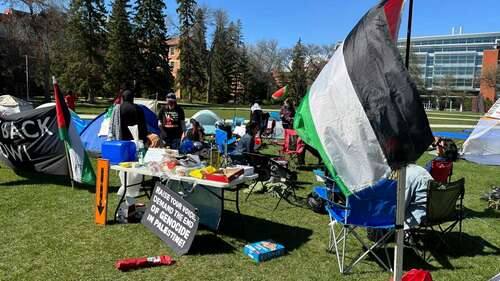Edmonton police Chief Dale McFee is defending the actions of his officers during the dismantling of the pro-Palestinian encampment at the University of Alberta Saturday morning.
McFee and Deputy Chief Devin LaForce allege there were clear signs protesters were creating an entrenched encampment formed to resist law enforcement, which explains why they decided to move in.
“There are those who seek to move these demonstrations in a more aggressive, more disruptive and frankly unsafe directions,” McFee said. “We are seeing this play out throughout the globe.”
Prior to police moving in, LaForce says protesters made requests for various supplies. “This indicated a commitment to defy lawful direction as well as the intent to accumulate food and equipment longer term,” he said.
LaForce says on the afternoon of May 10, several wooden pallets were delivered to the encampment. “This is not a protest supply. This is an occupation supply,” he added.
Police say that evening they began to plan their subsequent operation while protesters at the camp allegedly “began to self organize into groups.”
“This speaks to some of the organization of the encampment itself, that continued desire to become entrenched and fortified and the fact they had no plans to leave voluntarily,” the EPS deputy chief said.

LaForce alleges the encampment demonstrators were stockpiling fire extinguishers – an item he says has been used elsewhere to “blind and bludgeon” advancing police officers.
Police claim a book found later during the raid provided instructions on how to do just that.
That build-up – combined with the University of Alberta issuing protesters a trespass notice – led police to the campus on Saturday morning.
“It was probably a really good call on their part when they’ve got to protect thousands of students,” McFee said of the trespass notice.
Officers armed with batons arrived at 4:45 a.m. – 10 minutes after a U of A peace officer allegedly read protesters an eviction order. Police say they arrived to find a “front line of occupiers” with arms locked. Another eviction order was allegedly read out at 4:55 a.m.
“The occupiers were not asleep, and not in their tents when police arrived,” LaForce said. “All the occupiers were standing and refusing lawful direction. They weren’t sitting down peacefully, they weren’t laying down.”
Police moved in at 5 a.m. and quickly arrested two protesters – police claim they attempted to grab the batons from officers. A third demonstrator was later arrested. They were not students at the university, police have said.
Several social media videos show police advancing into the camp. EPS Insp. Lance Parker called the clash with protesters “incredibly minimal.”
“If you look at our officers in the video, you’ll see no shields, no helmets being worn and no masks,” Parker said.
Campus organizers claimed officers used tear gas during the operation, which EPS have repeatedly denied.
“Pepper balls, about 10 to 15, were shot into the ground,” Parker said. “And there was one muzzle blast of what was also an OC powder. There was no liquid spray on the crowd. Certainly no tear gas, no OC grenades and flashbangs.”
On Friday, police showed multiple videos of those interactions from different angles than those on social media. One video shared by organizers drew condemnation for what appeared to be an officer striking two students with a baton.
“The unpleasantness of watching any video of a use of force doesn’t mean that the use of force was excessive,” LaForce said. “Completely reasonable uses of force will be uncomfortable for most people to watch.”
EPS says no injuries were reported to police during the raid, and that a paramedic was on hand for anyone who needed it. Organizers shared at least one social media photo sharing a bloodied leg.
Police claim they found drugs and various tools that could be used as weapons against officers during the dismantling of the encampment.
McFee says most protests are peaceful, but this one wasn’t and could have become violent.
“Our job is to keep everybody safe,” the chief said. “As we’ve mentioned four times here, our job is to police behaviour not beliefs. Everybody is entitled to their beliefs.”
The Edmonton Police Service also decried the alleged “doxxing” of 11 of their officers, saying their names, addresses and identities of their family members were shared widely online.



